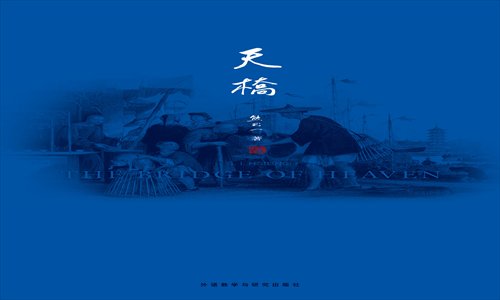Remembering S.I. Hsiung

In Chinese contemporary literature, bilingual writers like Lin Yutang (1895-1976) and Chiang Yee (Jiang Yi) (1903-77) are widely acclaimed, both at home and abroad. Yet there is another bilingual writer from the same period who enjoyed success overseas, but until now, remained almost unheard of among domestic readers.
Now with the domestic version of his signature book, The Bridge of Heaven, published for the first time in the Chinese mainland in Chinese language, author S. I. Hsiung (1902-91), or Xiong Shiyi, is receiving the attention he deserves.
"Hsiung is one of the three masters who greatly contributed in the cultural exchange between China and the West," said Shu Yi, the son of Chinese contemporary writer Shu Qingchun, or Lao She (1899-1966), and the former president of National Museum of Modern Chinese Literature.
"Though Lin Yutang is well known and Chiang Yee's works are gaining popularity in China in recent years, people hardly know of Hsiung," said Shu at a reading event in Beijing on October 13 organized by book.ifeng.com and Foreign Language Teaching and Research Press (FLTRP), the publisher of the Chinese edition of The Bridge of Heaven.
Bridging China and the West
The English version of the book was first published in London in 1943 during WWII (1939-45). The use of paper during that time was strictly limited. The"Book Production War Economy Standard" stamp was commonly found in books published then.
"During this time, the book sold more than 10,000 copies within a month, according to the records," said Xiong Wei, grandson of S. I. Hsiung and now the Dean of Foreign Language College at Beijing Geely University.
The book reaped such success in Britain that it was reprinted dozens of times and translated into French, German, Dutch, Swedish and Spanish.
"The 322-page book is a Chinese social commentary, blending local customs (mainly in Nanchang, Jiangxi Province, Hsiung's place of birth) into a series of historic events at that time (late 19th and early 20th century)," said Zhao Yaru, an editor from FLTRP who oversaw the Chinese version of The Bridge of Heaven.
The novel depicts the struggles of the Li family in Nanchang and the growth of Li Datong, the main character. It reflects the changes to people's life brought by a series of historic events, uprisings and reforms in the late Qing Dynasty (1644-1911).
"Taking part in the Wuchang Uprising and the final establishment of the National Republic of China, the character Li Datong reflects part of the author's own experiences and thoughts on the country's future," said Chen Zishan, professor in the Chinese language and literature department at East China Normal University in Shanghai.
"The book is a social satirical novel, it's witty and humorous, a style that is a characteristic of my grandfather," said Xiong.
"As he wrote in the preface of the book, Hsiung's purpose in writing The Bridge of Heaven and Lady Precious Stream was to bring the real China to the West, since information at that time was limited," Zhao told the Global Times.
In the preface of the overseas and Hong Kong edition of the book, Hsiung wrote that many Chinese writers painted unflattering portraits of their people, depicting caricatures who indulged in polygamy, foot binding and smoked opium.
"That's why I want to write a social novel based on historic events, presenting Chinese people as the [same as those] in foreign countries. We both have the wise and stupid, the ethical and unethical."
Popularity overseas
Chinese bilingual writers in the early to mid 20th century played an important role in showing a different side of China to the world, during a time when China was undergoing tremendous change.
Lin's works, Moment in Peking, My Country and My People and The Importance of Living, and Chiang Yee's The Silent Traveler Series (a collection of travel notes with pictures he drew himself), depicted Chinese people in a different lens.
After leaving China for Britain in 1932 to study foreign dramas, Hsiung tried writing plays himself. In 1934, his first English play Lady Precious Stream, based on traditional Chinese Peking opera Red Mane Horse, was published in London. It was this play that brought S. I. Hsiung fame overseas.
In the winter of 1934, the play was staged in London, then Switzerland, Ireland, Germany and other European countries. The next year it was presented on Broadway in New York.
S. I. Hsiung then translated from Chinese the play The Romance of West Chamber, and produced several original English plays like The Professor From Peking and Mencius Was a Bad Boy. The production of The Bridge of Heaven marked the second height of Hsiung's achievements.
Domestic obscurity
Unlike Lin and Chiang, whose works had been recognized in China, most of S. I. Hsiung's works remained in oblivion for decades.
Hsiung's works didn't have Chinese translations until decades later. In 1956, the Chinese version of Lady Precious Stream was published in Hong Kong. In 1960, Hsiung finished the Chinese version of The Bridge of Heaven in Hong Kong.
"The mainland version of Lady Precious Stream wasn't published until 2003, by the Commercial Press," Xiong told the Global Times. "The Bridge of Heaven in Chinese was published for the first time this year."
"Hsiung's popularity in Britain is as high as Lin's in the US," said Shu.
Shu attributes Hsiung's obscurity in China to his label as a "right-wing" writer then.
"In the realm of literature, Hu Shi (1891-1962), Lin Yutang and Liang Shiqiu (1903-87) were once deemed as the representative 'right-wing' writers in the country."
"But we have now changed our evaluations," said Shu. "It's also time to reevaluate Hsiung's literatry achievements."